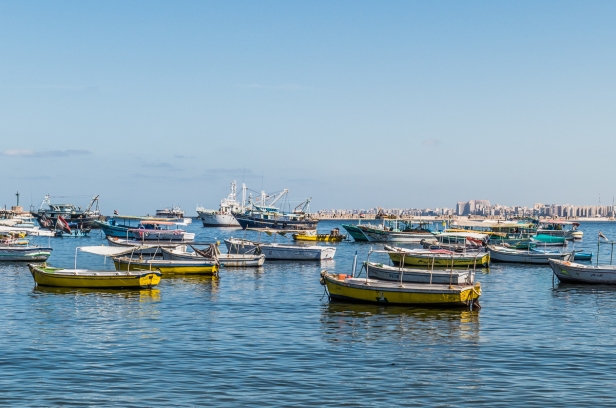
13-15 October 2015. We’re up early. Painfully early. Out in front of the hotel I watch as our group’s luggage is loaded into the minivan. Don and I have hard-shell carry-on size cases. They are on the bottom of the pile on the trolley and stacked one on top of the other. It is yet another little piece of travel serendipity that I notice this. Our cases are slippery. Our laptops are in them. I see disaster on the way, so I stand by to save our cases from crashing to the ground. Sure enough as luggage piled on top of them is removed the cases start to slide, Don’s in one direction and mine in the other. I try to stop both from falling. I manage to catch one of them just before it hits the ground. Fortunately there is a porter on the other side of the trolley and he catches the other. From that moment on I guard our cases like a hawk. Not that that’s much different from what we normally do anyway. We do things like never leaving an airline counter until we see that the correct destination tags are attached and our cases are moving along on the conveyor belt; one of us always waits to make sure our luggage goes into the hold under the bus before boarding. We are ever vigilant.
Although our departure time is 6.30am, which doesn’t thrill me, and probably doesn’t thrill anyone in the group, this is what I write in my journal: Grateful to have someone to drive me through the crushing smog-thick Cairo traffic. Grateful for a travel mug of hot sweet coffee. Grateful for Hoda, our guide, who takes care of everything for us. Grateful for saving our cases from falling off the luggage trolley.
And so we drive from Cairo north to Alexandria on a fast eight-lane freeway slicing through the bare heartless desert.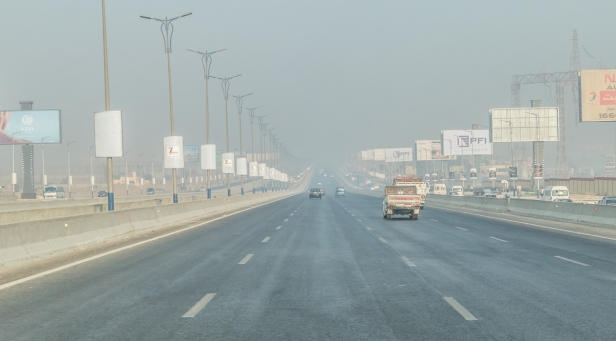
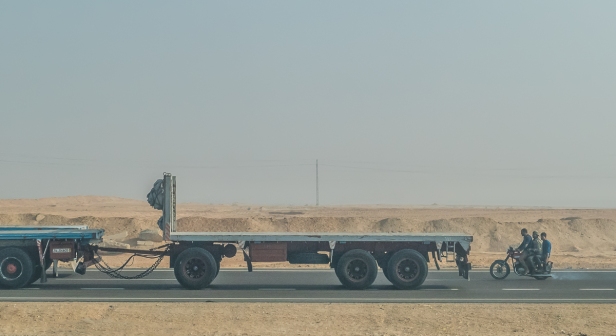
Alexandria dates back to 332 BCE. It is one of the world’s oldest continuously inhabited cities. Once beyond the highway and into the city I am struck by how like Delhi it is. People and their homes, vehicles and businesses, are all crammed in on top of one another: teeming, congested, shabby, pulsing, insistent. Only the script and the costumes are different.
I snap photos from the minivan as we inch slowly forward through the narrow congested streets: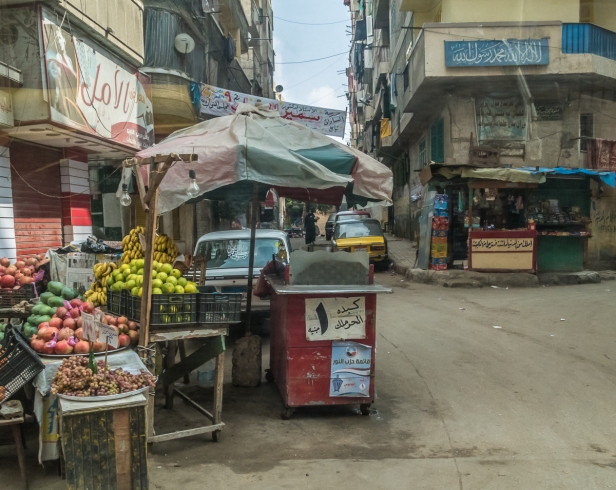
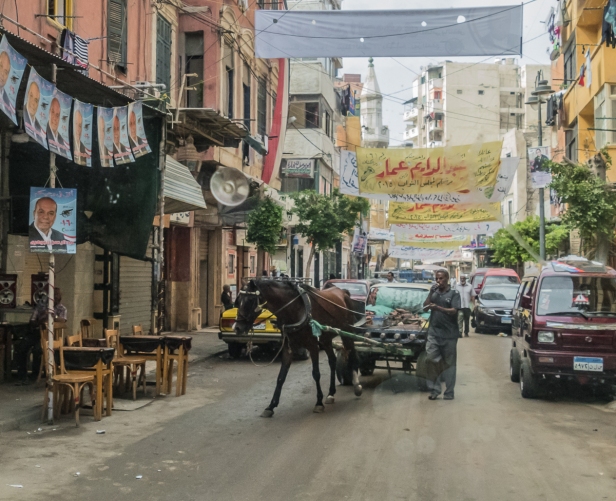
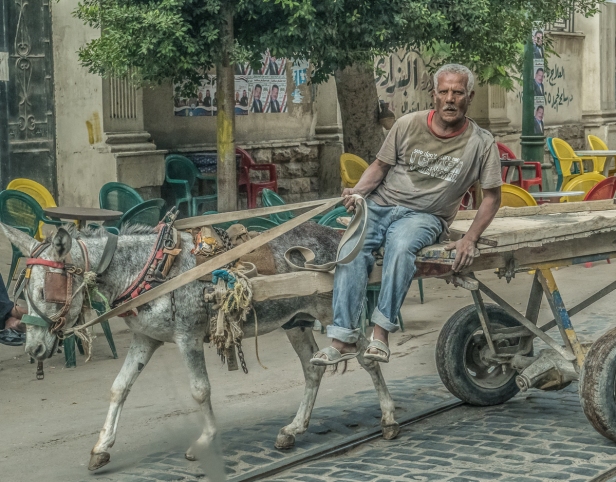
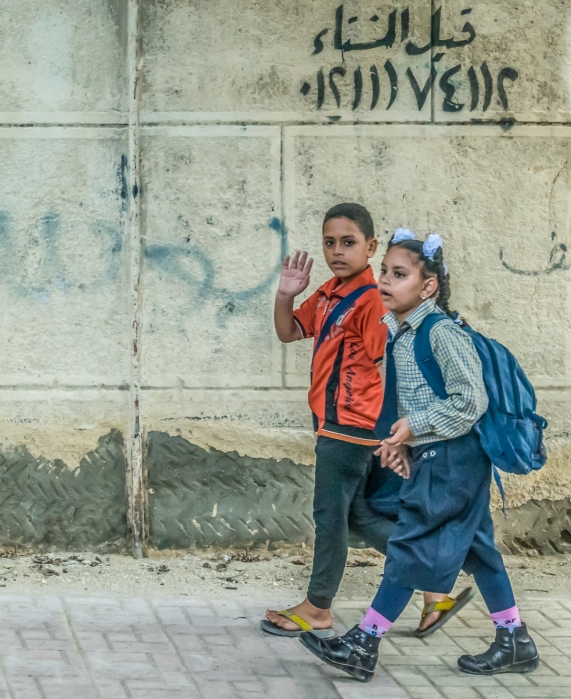
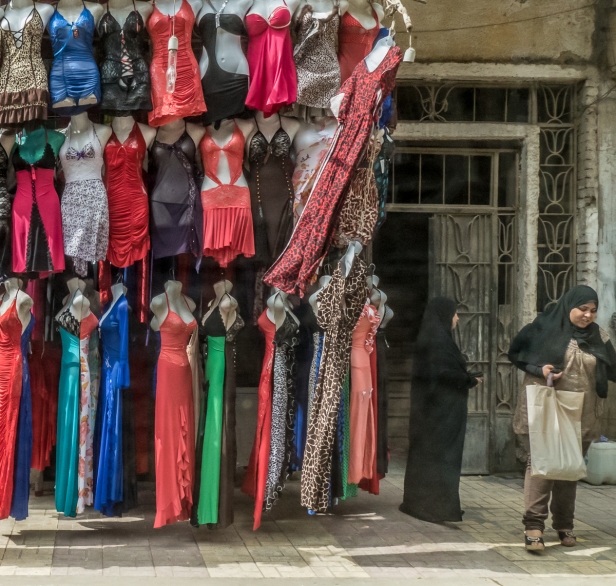
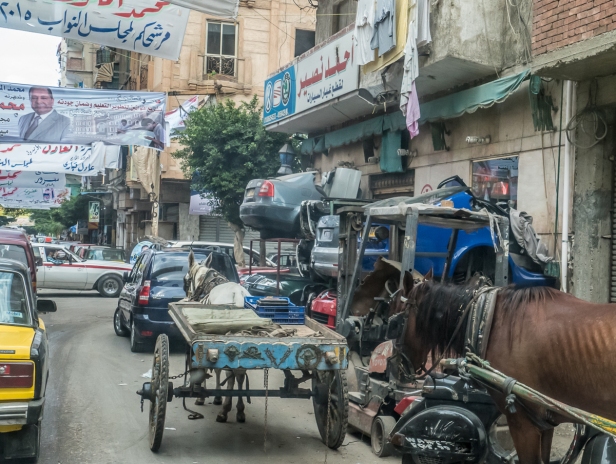
In one area there are several streets of ‘chop shops’ all crammed together selling every car-part you could possibly need, from half a car to a fan belt.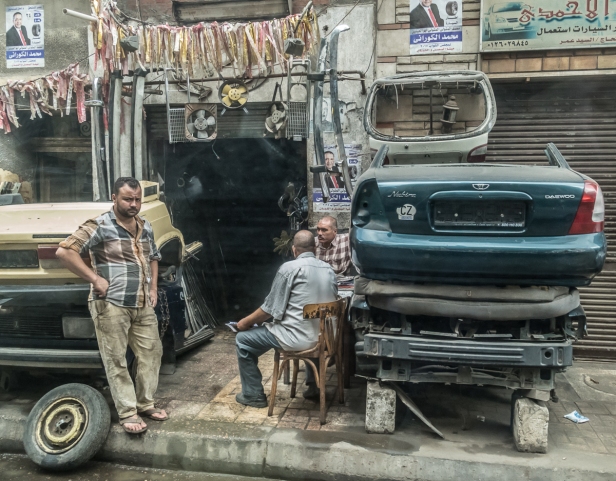
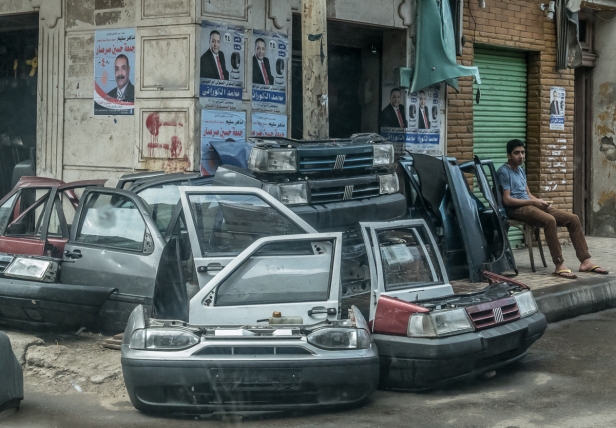
We came into Alexandria via the back door. Alexandria sits on a small spit of land on the western edge of the Nile Delta facing its front door, the Mediterranean Sea. This cosmopolitan city has long been an integral part of Mediterranean life, trade, and culture. It owes its heritage perhaps as much, or more, to that world than to the rest of Egypt at its back. With a population of over four million, it is Egypt’s second largest city and a major economic centre. Once a small ancient Egyptian town, Alexander the Great founded the city almost two and a half thousand years ago. It became a great centre for Hellenistic scholarship and science, and the intellectual and cultural hub of the ancient world, famous for its extensive library. It was the capital of Greek, Roman, and Byzantine Egypt until its surrender to Arab forces in 642 CE. In its heyday it was the second most powerful city after Rome. It was also a city that was ravaged by fires and street fighting. And during the lifetime of Cleopatra, while Rome was still a backwater, it was the centre of the universe.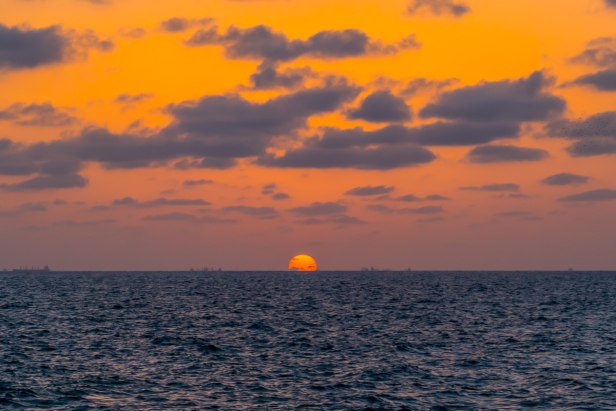
We can roam the bloated stacks of the Library of Alexandria, where all imagination and knowledge are assembled; we can recognize in its destruction the warning that all we gather will be lost, but also that much of it can be collected again; we can learn from its splendid ambition that what was one man’s experience can become, through the alchemy of words, the experience of all, and how that experience, distilled once again into words, can serve each singular reader for some secret, singular purpose.
– Alberto Manguel
The Royal Library of Alexandria, founded at the beginning of the third century BCE, was once the greatest and most important library in the world. It was said to contain all human knowledge. Due to the burning of manuscripts it has become known as a symbol of the destruction of knowledge.
How dare you and the rest of your barbarians set fire to my library? Play conqueror all you want, Mighty Caesar! Rape, murder, pillage thousands, even millions of human beings! But neither you nor any other barbarian has the right to destroy one human thought!
– From the 1963 movie Cleopatra
Probably the manuscripts of the library were burned on more than one ancient occasion. Four possible situations include: during Julius Caesar’s civil war in 48 BCE; the attack by the Roman Emperor Aurelian in CE 270 – 275; the decree of Coptic Pope Theophilus of Alexandria in 391 CE; and the Muslim conquest of Egypt in CE 642. And so this great repository of knowledge and culture was lost to antiquity.
Modern Alexandria, however, has a replacement: the Bibliotheca Alexandrina. It is an extraordinary building designed by Snøhetta, a Norwegian architectural office, and the winner of an international competition from among 1400 entries.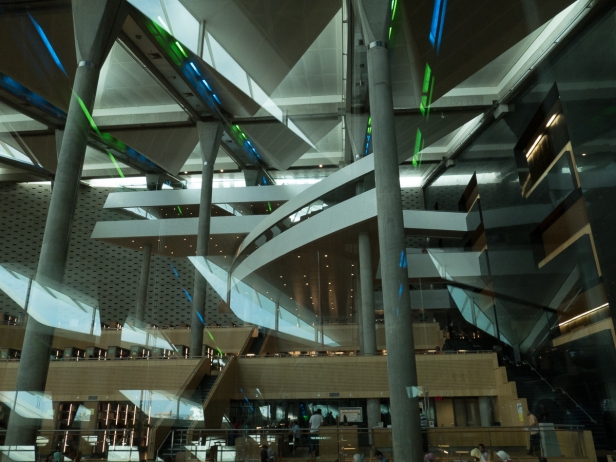
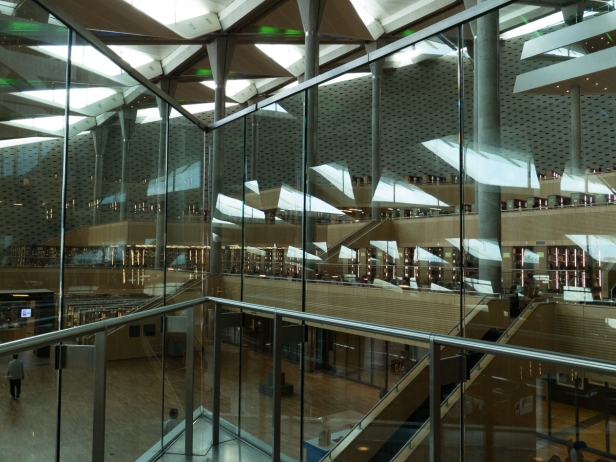
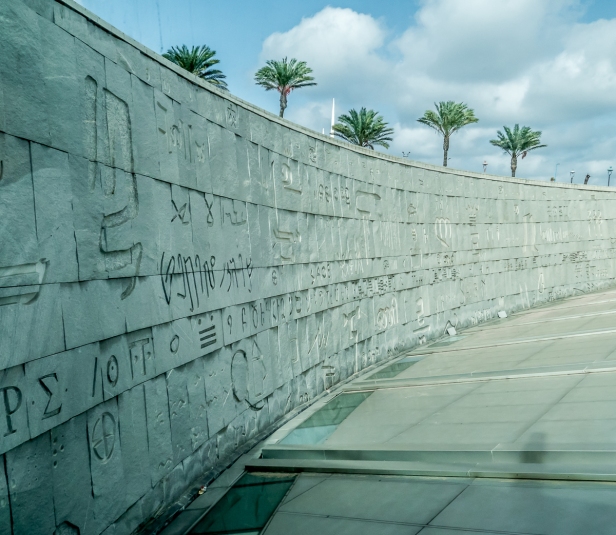
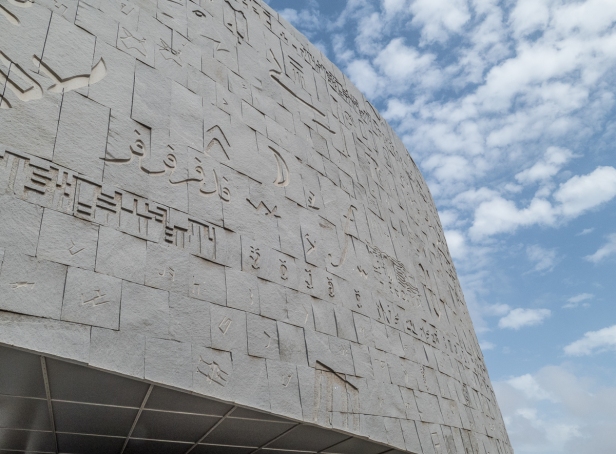
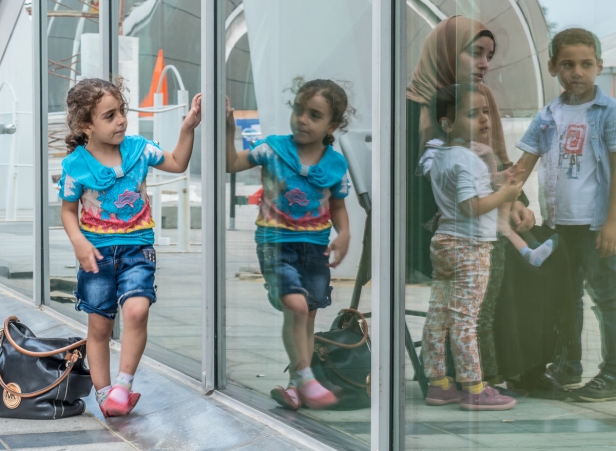
Modern Alexandria’s library is, like its ancient counterpart, one of the greatest libraries in the world. The library has shelf space for eight million books and a vast reading room. The building also includes a conference centre, four museums, four art galleries, a planetarium, and a manuscript restoration laboratory. It is trilingual, containing books in Arabic, English, and French. The granite walls are carved with the characters from over one hundred different scripts.
From the website of Bibliotheca Alexandrina: The Library of Alexandria was reborn in October 2002 to reclaim the mantle of its ancient namesake. It is not just an extraordinarily beautiful building; it is also a vast complex where the arts, history, philosophy, and science come together. Moreover, the myriad activities it offers have made it a place for open discussion, dialogue, and understanding.
We spend several hours exploring this extraordinary space. It introduces us to another side of Alexandria, which impression is underlined when we arrive at our unexpectedly luxurious hotel. We have fantasies of staying here forever. This is the view from our room with a glimpse of the Corniche in the background: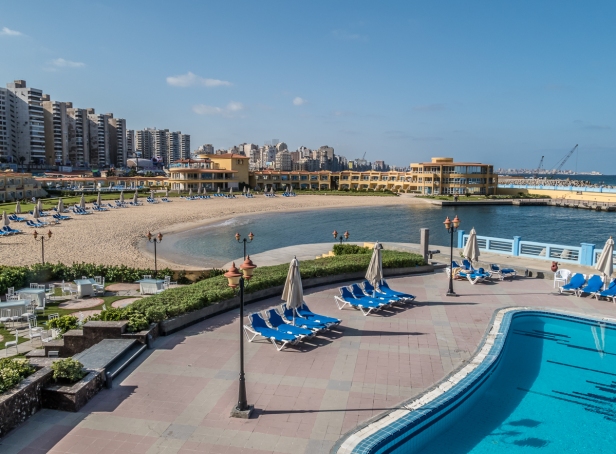
The Corniche, a broad waterfront boulevard, is typical of those found in most cosmopolitan cities on the sea with its palm trees and cooling breeze, and a string of high-rise hotels and apartments. But we also find real life here. There is every kind of traffic from BMWs to scooters to horse-drawn carts,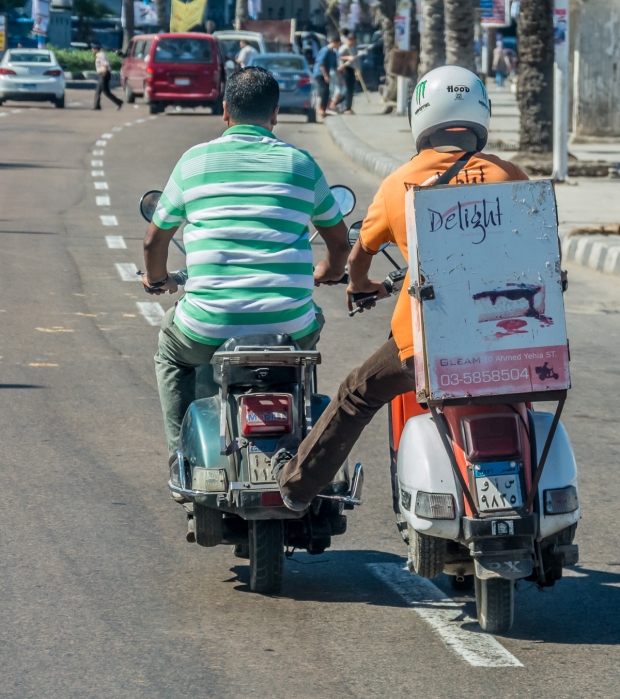
and down at the water there are boats and fishermen. And, much to my surprise, one lone fisherwoman.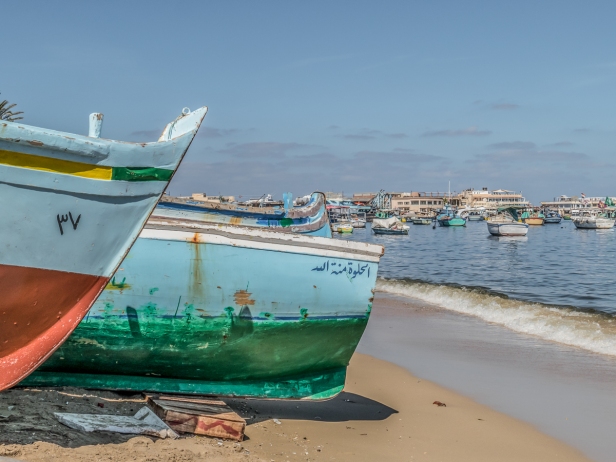
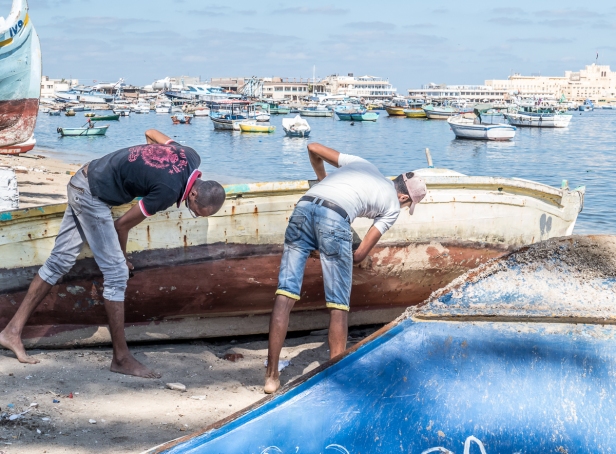
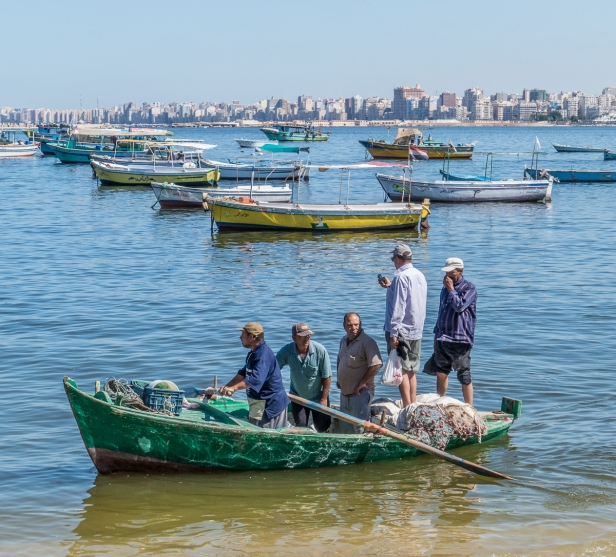
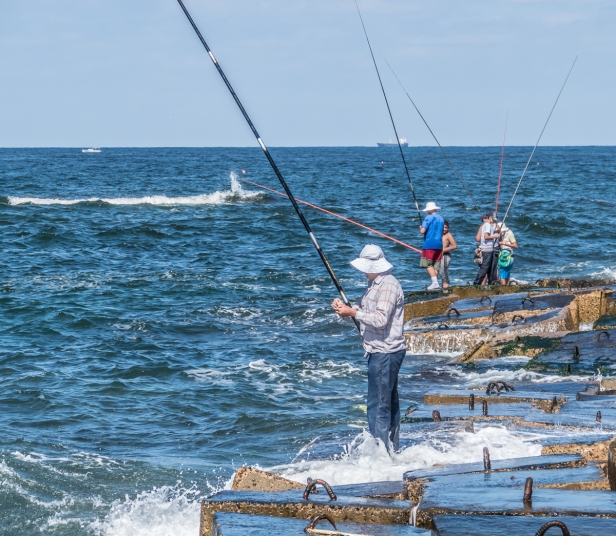
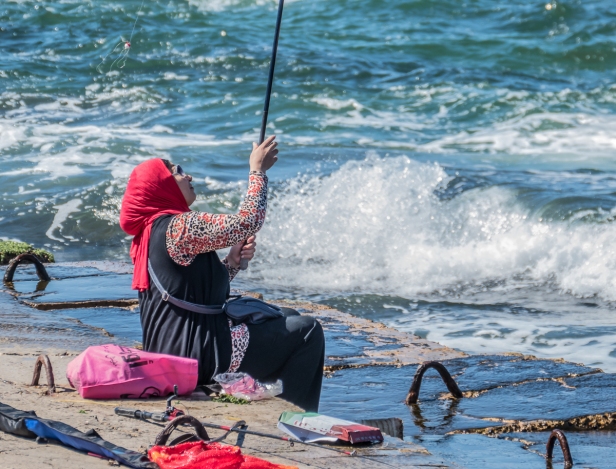
And there are visiting families come to enjoy the carnival atmosphere: horse rides and boat rides and cotton candy in pink bags.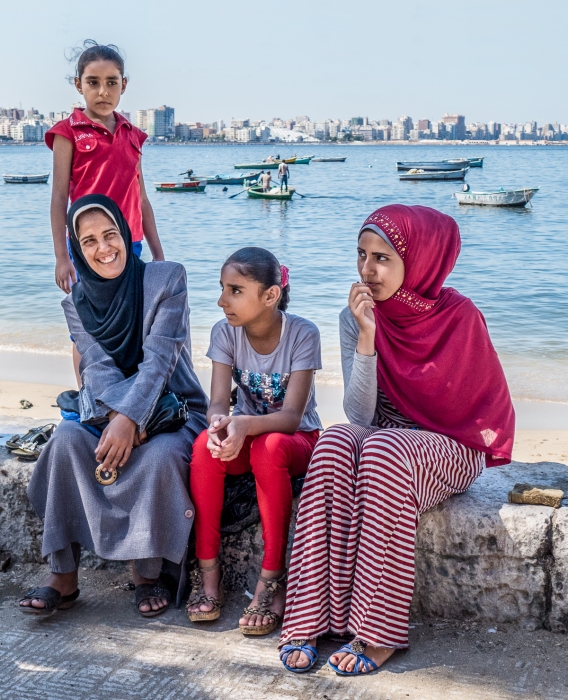
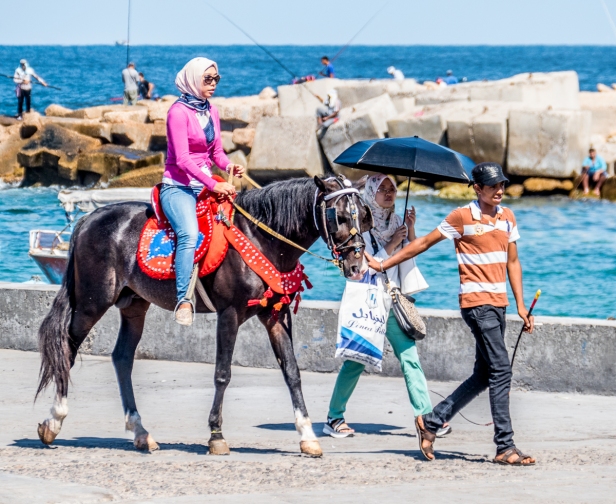
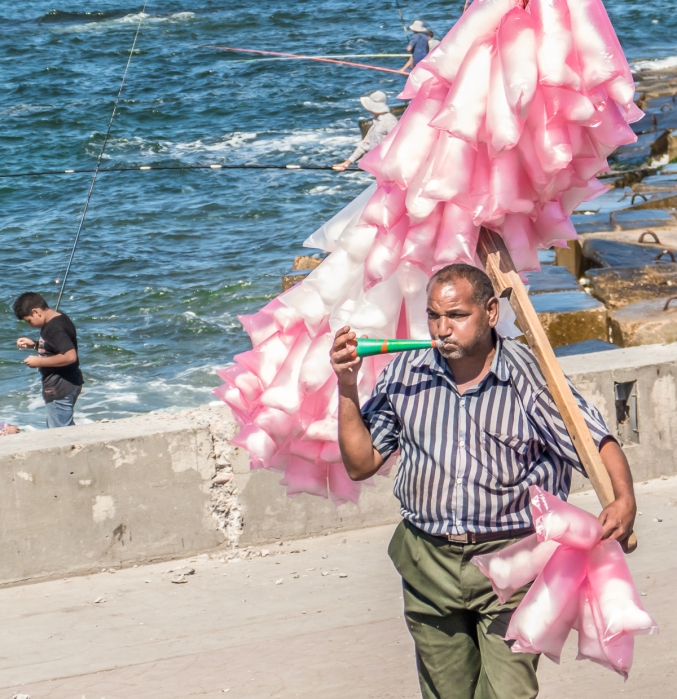
The colour-coordinated girls of Alexandria:
down by the waterfront,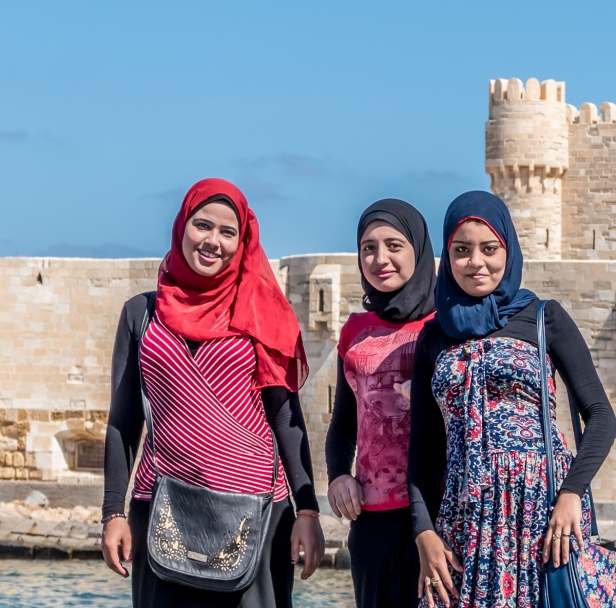
students at the library,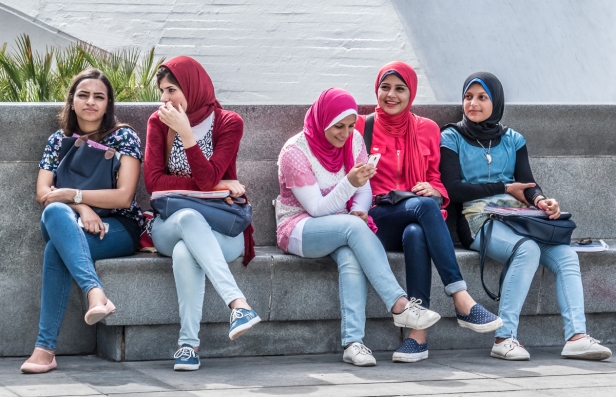
and through the van window.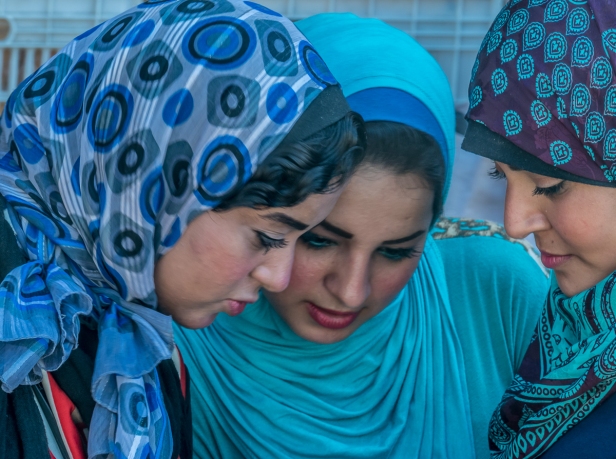
We have a long drive back to Cairo where we wait in the hotel lobby for a couple of hours before heading to the railway station for the overnight train to Aswan. We hang out on the station in the dark for an hour or so and once again I’m struck by the similarity to India: the crowds, the bustle, the seediness, children hawking anything and everything. I buy a small pack of tissues from a child, not because I want them, but because I know I will use them eventually, and clearly the child needs me to buy them, beautiful brown eyes tired and imploring. Trains come and go, families huddle leaning into each other, men smoke and chat. It is a microcosm of all of life.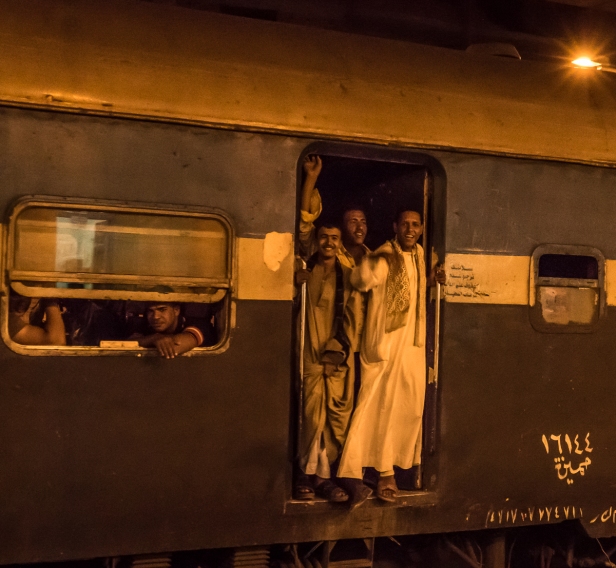
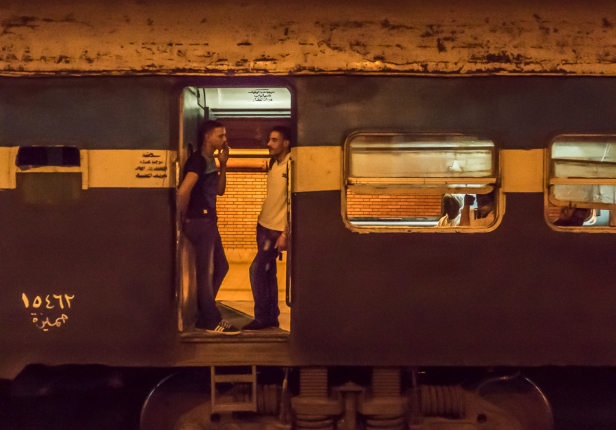
The train ride is an adventure but I don’t recommend it. The food, both a late dinner and breakfast, is dire. Dinner is over-stewed beef with rice and potatoes and overly sweet dessert. Breakfast is stodge. The private sleeper compartments are grubby (though the sheets are clean), and as Don puts it, it was like trying to sleep in a blender next to a jackhammer. What a night. And what a dramatic contrast to our accommodation the night before in Alexandria.
From the train we go straight to our hotel in Aswan with one hour to shower and change before boarding a boat on the Nile to Agilkia Island to see the Philae Temple of Isis.
Next post: A richness of Egypt both ancient and modern – the Temple of Isis and the city of Aswan.
All words and images by Alison Louise Armstrong unless otherwise noted
© Alison Louise Armstrong and Adventures in Wonderland – a pilgrimage of the heart, 2010-2016.

What amazing photos to go with your journey – many look like paintings.
LikeLike
Thanks Anne. I love the painterly quality, but have no idea how it happened or how to reproduce it. It was just the light at the time I guess. I rescued your comment from spam. I’ve been poking around your blog. Do I need to do the Feed Burner thing to follow?
Alison
LikeLike
Fascinating. You have some great people shots. I always thought of Alexandria in abstract, old-world terms and hadn’t realised it is such a busy, bustling place – though if I had thought about it I should have. I can see why you say it is like Delhi – especially your train shots – though I am only judging from pictures. We are due to go to Delhi later in the year and join Julie in Pushkar. It should be fun.
LikeLiked by 2 people
Thanks Helen. I think my favourite people shot is the three girls in blue. I too was surprised by Alexandria. I hadn’t really even thought about it at all, but really it’s a big city so I don’t know why I was surprised. Delhi is even more crowded, intense, etc. We loved it. And Pushkar is amazing. It will be especially good because Julie has so many friends there now so you’ll see/do things that most people won’t. Have a great trip!
Alison
LikeLike
Alexandria certainly seems like a land of contrasts. I love your candid shots of people. Your blog teaches me so much about places I may never see…love it.
LikeLiked by 1 person
Thanks LuAnn. I love photographing the people of the places we go to. My blog teaches *me* about places, places I know almost nothing about until I start researching for the blog.
Alison
LikeLiked by 1 person
That is one of the blessings of writing a blog…all the knowledge gained.
LikeLiked by 1 person
Hi Alison and Don. You’ve had some amazing journeys and I love to read about them because I would love to be travelling to these places too. Each time I read your articles and pore over the photographs, I feel my heart stir within me with a great longing to be there also.
I love the Alexandria Library. What an amazing place that is with its 8 million books! The train journey to Aswan sounds horrendous. It reminds me of the Palatino night train from Paris to Rome. Never again! Lovely to hear from you both. Stay safe. ♥
LikeLiked by 1 person
Thanks so much Isabellarose. I get the same feeling from blogs I read about places I’ve not been to yet, that same heart stirring. I guess we are just travellers at heart. The new Alexandria library is quite magnificent, and the train journey the opposite! Still it was all part of the adventure.
Alison
LikeLiked by 1 person
I had no idea they’d built a new Alexandria Library, and I am delighted by that fact. What beautiful pictures! I’ve never been to India, but I can see from your photos why it might feel similar.
LikeLiked by 1 person
Thanks Felicity. I had no idea about the library, and was quite blown away by it. It’s a huge and beautiful building, and my photos do not do it justice.
Alexandria felt very like India – crowded and grubby and shabby and *alive*
Alison
LikeLike
Your pictures continue to be an inspiration for me!
LikeLiked by 1 person
Thanks so much TS. That’s a wonderful compliment!
Alison
LikeLike
A place with so many contrasts.. the man with the donkey looks like from a very old movie.. the sleeveless outfits beside the 2 women dressed from head to toes.. Lovely sunset.. or was sunrise?? lol
LikeLiked by 1 person
It was sunset, and quite spectacular. I thought the photo of the women next all those sleeveless outfits was such an interesting juxtaposition. And the guy on the cart could have been from an old movie, except perhaps for his clothing. There is a stark mix of lifestyles and wealth – it was hard not to notice it.
Alison
LikeLiked by 1 person
I love the new library and your take on it! Pleased you got to see this ancient, vibrant city. Your pictures are, as always, simply amazing.
LikeLiked by 1 person
Thanks Darlene. It’s a quite wonderful city. And I was totally surprised by the new library – I had no idea. So great that they built something to revive the ancient heritage of the city.
Alison
LikeLike
What an amazing place Alison! You’ve been to some places that I would love to see someday! 🙂 I’m enjoying reading about it all.
LikeLiked by 1 person
Thanks Nicole. I hope you get there one day. Alexandria was a surprise. It was not a highlight of Egypt, but I’m really glad we went there. I had no idea what to expect so I was constantly amazed. The biggest things were the initial entrance to the city through all those shabby crowded streets – like Delhi, and also like Hanoi, and I’m sure like many other cities in the world – and the library that I knew nothing about.
Alison
LikeLiked by 1 person
How safe did you feel in Egypt? I am normally not too worried but I’m not sure about Egypt. Curious what it was like for you Alison.
LikeLiked by 1 person
We felt completely safe at all times. We deliberately chose to do a tour in Egypt for security reasons. I think even independent travel would be okay as long as you don’t go beyond the main tourist sites, and don’t go to the Sinai. There are no guarantees of course. Egypt is desperate for tourists so the advantage of going at this time is that there are no hoards of people at all the main sites.
Alison
LikeLiked by 1 person
Thanks Alison! I have no idea when I will ever make it there but would love to so much.
LikeLiked by 1 person
Your writing gives me wanderlust! Your photos aided in that emotion too. I think the one of the three women in blue is stunning! Oh, I if I get to that part of the world, I will not ride the train.
LikeLiked by 1 person
Thanks so much. The one of the three girls in blue is a favourite of mine too. I hope you get there one day – it’s a really fascinating part of the world. Sorry about the wanderlust 🙂
Alison
LikeLiked by 1 person
The photo of the three girls in blue is stunning, but I also really like the photo of the hijab-wearing ladies next to the display of skimpy outfits! Great contrast.
LikeLiked by 1 person
Thanks Fiona, that photo is one of my favourites too. And the other one you mentioned – I love the ironic juxtaposition – it was everywhere we went in Turkey, Jordan, and Egypt.
Alison
LikeLike
beautiful series…the smiling faces…always leads me to be more curious about lives and spaces that I’ve never been too…such rich his/her stories…I love the time before dawn…the colours and quiet…dreamy post! Thank you Alison ☺️
LikeLiked by 1 person
Thanks Hedy. There are so many stories here – what does the man with the donkey do? What are the girls in blue looking at? And those students at the library – what is the girl in pink smiling at, and how does that girl feel riding a horse for the first time? As always when I do a blog post I wish I could go back and find out more – about the place, about the people.
Alison
LikeLiked by 1 person
oh yes I understand…I always wonder how they see me as outsider with a camera…not knowing language or cultural realities…I like the narrative threads and story bits of the photos I take
LikeLiked by 1 person
Oops phone fingers and a Hedy thought ☺️ there is both the relational aspects of photographing and the show and tell part…I also appreciate the retellings 😀 also it’s lovely to create new memories ho knows perhaps you return and find them all grow up…wonderful thoughtful post as always…thank you ~ smiles Hedy
LikeLiked by 1 person
Thanks Alison once again for a fascinating post. I am continually impressed by your shots of the people on the streets as they provide such a powerful view of the heart of the places you visit. Tim (and Anne).
LikeLiked by 1 person
Thanks Tim and Anne. I think the people of the places we visit are one of the most, if not the most important thing. Even with ancient sites it’s the people (past and present) that bring life to it. So I photograph them in order to try and capture the energy of the place. And yes, the heart.
Alison
LikeLiked by 1 person
Entrancing. You have some incredible individuals shots…I love your real to life shots of individuals. Your website shows me such a great amount about spots I may never see… love it.
LikeLike
Hello Ranthambore people. i think we went on safari with you when we were in India. It was wonderful. Thank you for your kind words. Maybe you’ll get to Egypt one day.
Alison
LikeLike
Yes Alison, still we are not there anytime and we not sure to visit to Egypt.
LikeLiked by 1 person
Sounds like you went the full circle with this stop. I love the gorgeous water-color quality of some of your photos. Beautiful!
LikeLiked by 1 person
Thanks Susan. I was really pleased with that water-colour quality. I don’t know how I did it. It was just the quality of the light and I have no idea how to replicate it. I wish I did.
Alison
LikeLiked by 1 person
I’m racing to pack before my 4 am pick-up tomorrow morning (FINALLY time for Mongolia!) but had to say how much I enjoyed the writing and the photos here today, especially those girls in blue!!! Wow – the colors there are simply sublime, right down to the eye liner!
LikeLiked by 1 person
Thanks Lexie. (Are you a Lexie?) I was thrilled with the photo of the girls in blue – a lucky shot that turned out that I got while the van was stopped for some reason or another. It’s like first they dressed for me complete with eyeliner, and then they posed for me.
Have a *fabulous and amazing* time in Mongolia! Jealous.
Alison
LikeLiked by 1 person
Yes, I’m an Alexandra, called Lexie by most, and Lex by some. Named in some small way after the same fellow as your city here, as are many of my Greek relatives going back millennia! Thanks for the good wishes – I am SOOOOO excited! 🙂
LikeLiked by 1 person
I love your photos. You capture people so well. My favorites are all the fishing and boat pictures.
LikeLiked by 1 person
Thanks so much jpeters. I really like all the fishing and boat pictures too. The light was so lovely, and I managed to capture it. I never know if I will or not.
Alison
LikeLiked by 1 person
Your hotel…oh, yeah…that’s one of the great perks of taking a tour–they give you pretty good digs, and sometimes the food is even edible even if it is a buffet. Having someone drop your luggage with a computer inside, yeah, well, that’s a downside. The girls in blue is a beauty, of course. But the one I truly like is the guy on the cart pulled by the donkey. It speaks to me! Also like the car junkyard on the sidewalk!! The other photo that strikes me is the one with people fishing, the color in that shot is amazing, and the composition of the poles, love it.
Get this…my laptop broke.
LikeLiked by 1 person
That hotel in Alexandria was pretty lush, the train on the other hand was dire. Most of the hotels on that trip were 3 star and okay, that’s why the Alexandria hotel was such a fabulous surprise. Luxury for a night! Oh I too really like the guy on the donkey-cart. It’s one of my favourites, something about the clarity and the muted light and colours. I was blown away by the sidewalk car junkyards – never seen anything like it. I think I like the men in the fishing boat better than the fishing poles one. I have no idea how I got the light in either of them. There’s so much I don’t know – I just fiddle with exposure/Fstop/iso/shutter speed and hope for the best.
RIP BF’s laptop. Were you seriously aggrieved? I would be!
Alison
LikeLike
Yeah, I know what you mean about the men in the fishing boat. But for some reason, the colors and brightness (if not so much the composition) just really appeals to me in the fishing pole shot.
Luckily, there is a Mac fixit shop here, but they have to order a part, hopefully will be here Monday or Tuesday. My laptop is old, like four years. That’s like a dinosaur isn’t it?
LikeLiked by 1 person
What a trip and so many amazing photos. Can’t help but be amused by the burka / hijab clad women next to the skimpy negligees. 🙂
LikeLiked by 1 person
Thanks Carissa. The whole Egypt tour was amazing, and Alexandria quite unexpected. I’m glad we went there. That jarring juxtaposition of skimpy articles for sale and women covered from head to foot is all over Jordan and Egypt. I did a double-take every time I saw it. It’s such a statement about how women are viewed.
Alison
LikeLiked by 1 person
It is indeed…
LikeLiked by 1 person
Wow, such an excellent report. Loved reading it and the photos were amazing. All that history really shone through your description.
LikeLiked by 1 person
Thanks TSMS. Alexandria was a pretty interesting place to visit, with a history just about as old as time. I’m glad I was able to express some of it.
Alison
LikeLiked by 1 person
colorfully brings empathy
& understanding of the conditions
of the land & people of Alexandria!
gratitude to you two 🙂
LikeLiked by 1 person
Thank you David.
Alexandria is a
mesmerising mix of
old and new.
Egypt – no other place
like it. In awe!
Alison
LikeLike
Beautiful snapshots Alison. And timely save of your laptop! We skipped Alexandria to be able to stay longer in Luxor. Your fabulous account is making me regret it big time. Looking forward to reading about your journey down the Nile. We are both not cruise people, but it was here that we fell in love with slow river cruising.
LikeLiked by 1 person
Thanks Madhu. Alexandria was pretty fascinating. Not a highlight of Egypt but I’m very glad we went there. And I know – soooo much to explore in Luxor. Posts to come about that, and about the Nile cruise which was spectacular. We also fell in love with slow river cruising. Hopefully the Danube one day! (Though I suspect it will be considerably pricier that the Nile so i’m not sure we can afford it.)
Alison
LikeLike
What a diverse land of contrasts. I felt as if I had traveled to several different countries through your photos. Like you I am a hawk with our belongings. It’s really one of the key reasons we travel with carry on only 90% of the time.
LikeLiked by 1 person
Egypt was one of the highlights of all our travels for me. Alexandria does’t come out at the top of the list of places we went in Egypt, but I’m sure glad we went there and the library is really something special. We’ve thought about travelling with only carry-on but because we more or less live on the road we travel with things like scissors and good quality kitchen knives which need to be checked. Also we travel with our laptops plus back up drives which take up a chunk of space in out backpacks. But you’ve got me thinking about paring down again 🙂
Alison
LikeLike
It feels like such a gift to read these posts by you. I loved seeing pictures of the new library in Alexandria and lament the loss of the one of antiquity that contained all the knowledge of the world. In your photographs, I’ve noticed an evolution of the hue of blue. First, I spotted some special quality to the texture of a pair of blue jeans in a previous image, in a previous post. Now I recognize a similar effect here in another pair of blue jeans. The images are stunning: especially the 3 women in blue. It’s painterly. I’m moved by all these images you’ve included so I’d surely be able to use that pack of tissues you bought from the child for some of my tears over the beautiful and immensity of it all.
LikeLiked by 1 person
Thank you so much Ka. The new library is quite magnificent, as is the motivation behind it. That’s an interesting observation about the blue in my photos. I am aware to not oversaturate, and I’m especially pleased with the way the photos of the waterfront turned out, but I don’t know how I did it so can’t necessarily replicate it. I think I need to pay attention more to exposure. I too love the photo of the three women in blue. It was a lucky chance that I saw them. Yes, the immensity of it all. Sometimes I forget. But that just makes me appreciate it all the more when I remember.
Alison ❤
LikeLiked by 1 person
Fascinating! Your words and images really do a wonderful job of conveying the clash between old and new-of tradition and modernity. One of my favorite images *and there were many) were of the western-styled women’s clothing and the two women in traditional garb-good stuff!
LikeLiked by 1 person
Thank you Meg. Alexandria was a surprise. I never expected it at all. I had no idea what I was going to – to enter a city so like Delhi the contrast with the Corniche was quite remarkable. I too was struck by the juxtaposition of the two women next to the skimpy western outfits. So incongruous, though of course the women wear whatever they like in their homes.
Alison
LikeLike
Ah, but what is an adventure without a sleepless train journey and horrible stodgy food? 🙂
LikeLiked by 1 person
Oh yes! It was a good adventure, and now a good story to tell, but I have no wish to repeat it. Having travelled overnight on trains in Turkey, Australia, and Egypt (I think that’s all) I’ve come to the conclusion that I will only do it on those high speed high class smooth trains in Europe. We did a trip from Amsterdam to Zurich once (can’t remember if it was o’night or not) and the dining was excellent.
Alison
LikeLiked by 1 person
Heh, gotta love those high speed inter-city European trains!
LikeLiked by 1 person
It’s good to be ever-vigilant when so much of what you own is carried with you! As always, I loved your photos, especially of the people which offer such a glimpse into the country and customs. My favorite was of the little girl gazing into the glass with the reflection of the young mother and her children in the next surface. And I had to laugh and shake my head at the photo of the fully robed and scarved shoppers standing next to the skimpy dresses – clearly a country of contrasts and contradictions! Anita
LikeLiked by 1 person
Thanks Anita. I watched that family, and others, reflected in the glass wall of the library for quite a while. It was a photo op too good to pass up. And we saw the juxtaposition of women covered from head to foot and the skimpy dresses at just about every souk in Turkey, Jordan and Egypt. I was always struck by the incongruity of it.
Alison
LikeLike
Oh, Alison and Don, what fantastic travel; I’m so glad I get to follow along with you. The photography is splendid, all of it….but that library!!!!! I’m swooning at the glory of it.
LikeLiked by 1 person
Thanks Angeline. The modern library of Alexandria really is an astonishing achievement. I didn’t even list all the facilities that the complex contains. And the building is beautiful. It was a complete surprise.
Alison
LikeLiked by 1 person
It’s all been said–a wonderful blog. But one question: what kind of camera do you have? (Surely not the phone????)
LikeLiked by 1 person
Thank you so much Carol. My camera is a Panasonic Lumix FZ1000. Not a full DSLR, but yeah, better than a phone.
Alison
LikeLike
“Fast eight-lane freeway slicing through the bare heartless desert” — I love that! And it’s still that I’ve only just realized it, but what an epic (in the true sense of the word) adventure you were having, all those places you visited, a sort of modern expedition through the desert, following in the footsteps of explorers of old. Such a journey!
LikeLiked by 1 person
Oops. I meant that it’s silly (not still) that I just had that realization.
LikeLiked by 1 person
Thanks SGMT. Egypt really felt like an epic adventure even though we were on a two week tour. We covered so much ground, but it rarely felt rushed. It was an amazing experience. I’d love to go back and do/see more but I doubt we will.
Alison
PS Don’t you just love autocorrect! 🙂
LikeLike
Loved this post, Alison. Especially Don’s description of the sleeper car!
Did you like the new library building? You described it as extraordinary, but did you love it? How would you compare the sensations of it to the mosques you wrote about a few months ago, for instance? I am curious. The way the lights and glass and angles came together in those images give it the sensation of a place flooded with interesting angles and such, but not necessarily with a real heart sense or organic richness?
I agree with Ka on the blue photo of the three women. Very pretty. But I love the facial expressions of the young women captured two photos prior– that shy amusement of being caught on camera, but no real guardedness– each individual so richly “herself”… And the girl beside her reflection in the glass. Beautiful…
And I just have to say it. I’ll take a latte, half a car, and a cotton candy.
Peace!
Michael
LikeLike
Thanks Michael. I also liked Don’s description of the sleeper car, and it was not an exaggeration, especially the jackhammer part. I think you hit it spot on in your feeling about the library. I didn’t love it. Even now thinking about it I can acknowledge that it’s an extraordinary and beautiful building, and the work that goes on in there in the acquisition and dissemination of information, and the service to a wide public from many different fields, still I wasn’t moved by it.
The blue girls was a simple gift from God – I was sitting in the minivan. I think it was stopped at the time, and I looked out the window and there they were, heads together, perfectly matched, but yes the other three – so open and slightly bemused, and innocent. And the child in the glass – I have many photos of people reflected in that wall of glass; a perfect photographic opportunity.
peace, Alison
LikeLiked by 1 person
I just love reading your blog, makes me want to read more or go off and do a little writing of my own. The photos too are amazing, the colours so vibrant and pretty.
Tip for your suitcase…stick a strip on non slip tape on each side of the cases. It is inexpensive and in a variety of colours. No more slippyy cases and no more panics.
Take care..we are in Finland and heading to Estonia on Saturday. Just finished 3 months tour of Norway and Finland…amazing. X x x
LikeLiked by 1 person
Thanks so much Joanne and Craig. And thanks for the tip re the cases! Sounds like you’re having a great time in Finland. Estonia has intrigued me for a while now. Perhaps we’ll get there one day. Closest we’ve been to that part of the world is Sweden.
Happy travels,
Alison xo
LikeLike